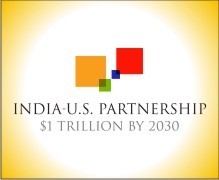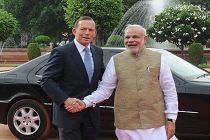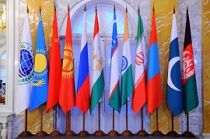Leipzig: from darkness into light
Rajni Bakshi, Senior Gandhi Peace Fellow, was recently at Leipzig in Germany to attend the 4th International Conference on Degrowth. She writes about why Leipzig is reassuring for more than its economic growth
 Courtesy: wikimedia
Courtesy: wikimedia
Rajni Bakshi, Senior Gandhi Peace Fellow, was recently at Leipzig in Germany to attend the 4th International Conference on Degrowth. She writes about why Leipzig is reassuring for more than its economic growth
 Courtesy: U.S. Staff Sergeant Aaron Allmon
Courtesy: U.S. Staff Sergeant Aaron Allmon
Obama’s strategy to target the IS in Syria within the framework of a U.S.-led international coalition has met with a tepid response. There are reports that the U.S may offer India a non-NATO ally status during Modi’s upcoming visit in a bid to seek greater support – a gesture that India will do well to disregard.
 Courtesy: Gateway House
Courtesy: Gateway House
Indian prime minister Narendra Modi's landmark visit to the U.S. in September 2014 was followed by U.S. President Barack Obama's historic visit to India this month. Anticipating a renewed partnership between the two countries, Gateway House, presents a research paper titled ‘The India-U.S. Partnership: $1 Trillion by 2030’ that advocates a different path for the India-U.S. bilateral from all others, one that will help deepen economic relationship with the U.S.
Professor M.D. Nalapat, Director, Department of Geopolitics, Manipal University, talks about Chinese President Xi Jinping’s visit to India. In an interview to Gateway House, he predicts that the visit will bring in a great deal of investment and be a step towards overcoming the negativity in the relationship
Neelam Deo, Director, Gateway House, talks about the significance of the position taken by NATO member countries at the recent summit in Wales. She says the increasingly acrimonious standoff between the West and Russia over Ukraine, and the stance on the Islamic State has implications for India.
 Courtesy:
Courtesy:
Contrary to some current commentary, NATO has remained relevant after the post-Cold War period, largely due to the perceptions it still engenders. While its symbolic power still endures, a rapidly changing international order could make it obsolete in the near future, as new narratives take its place.
 Courtesy:
Courtesy:
By using information and communication technology innovatively, Singapore has overcome the challenges of limited size and resources. There are many lessons here for India which is collaborating with Singapore on the Smart Cities project – especially when it comes to affordable housing and transport planning.
 Courtesy: wikimedia commons
Courtesy: wikimedia commons
Brazilian president Dilma Rouseff's bid for re-election has been ambushed in just two weeks by activist Marina Silva who is now predicted to win the October elections. If elected, Marina is likely to continue with the pro-poor policies of the current government, and she has already shown a keen interest in foreign policy. PM Modi will find Marina more proactive and forthcoming than Rouseff
 Courtesy: pmindia.nic.in
Courtesy: pmindia.nic.in
The India-Australia civil nuclear deal goes much beyond providing for India’s energy needs. The deal will help New Delhi’s bid to enter the Nuclear Suppliers Group and other technology control regimes. The ties with Canberra also have the potential to develop into a strong strategic partnership
 Courtesy: europesworld.org
Courtesy: europesworld.org
India's inclusion as a full-member will lend credibility to the Shanghai Cooperation Organisation, which until now has been dominated by China. However, until the strong differences between member nations are resolved, it will be a while before the SCO can become a multilateral force to be reckoned with